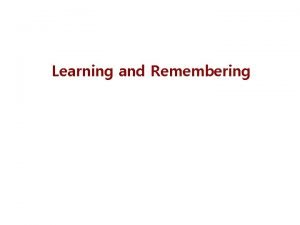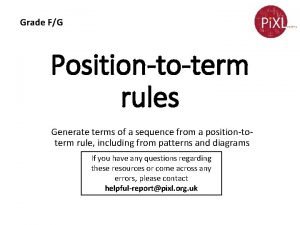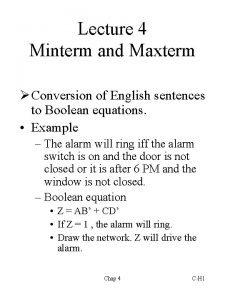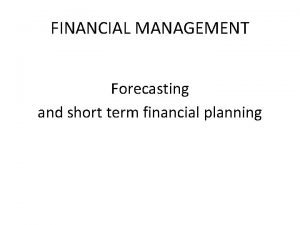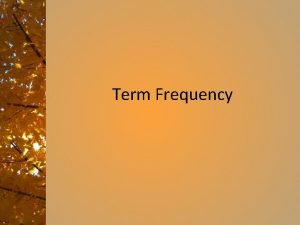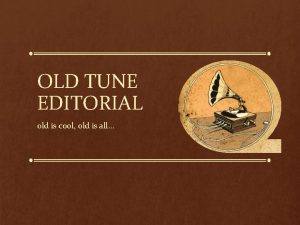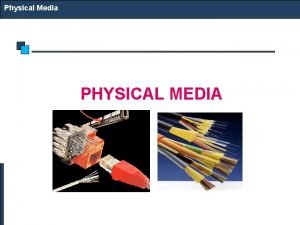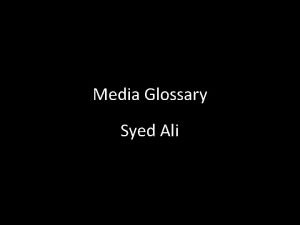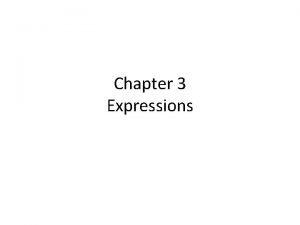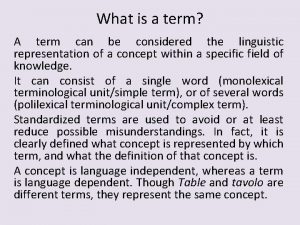OLD MEDIA OLD MEDIA The term old media




















- Slides: 20

‘OLD’ MEDIA

OLD MEDIA • The term old media has become synonymous with several traditional forms of mass communication: books, newspapers, magazines, film, sound recordings, radio and television.

NEW MEDIA PARADIGM SHIFT THE CONSUMER BECOMES THE PRODUCER • Anyone can produce and deliver content to a public audience. • User-generated content (UGC) or consumer-generated media (CGM) • Empowers individual for personal expression • Examples: • Posts a video • Share status • Share weather

NEW MEDIA • The term new media is used to describe the relatively recent emergence of digital technologies that have changed the way that content is produced, distributed and consumed.

NEW MEDIA • Media technology is developing at an unfathomable rate, which has massive implications for the way people communicate and interact with each other. The emergence of new media technology always has far-reaching social, economic, political and legal implications. It is usually accompanied by great promise as well as great fear. The increasing availability of media technology means that ordinary people have the opportunity to create and distribute their own media texts, challenging a paradigm that has existed since the advent of the printing press.

THE FIRST WEB PAGE • What year was the first web page created?

THE FIRST WEB PAGE (1993) • British physicist Tim Berners-Lee invented the Web at CERN in 1989 to help physicists to share information. The world's first website was in fact about the new technology - giving users information about the new system which allowed them to create their own web pages. On April 30, 1993, CERN made the technology which created the World Wide Web, available to the general public. • http: //info. cern. ch/hypertext/WWW/The. Project. html

CONVERGENCE • Convergence is the evolution / coming together of technology, (specifically media technologies) that allow for communication to advance. • 1968 The Beatles release ‘The White Album’, • 2003 Jay-Z releases ‘The Black Album’ • 2004 DJ Dangermouse mixes both ‘The Grey Album’ • https: //youtu. be/Ct. P 1 i 6 My. CP 0

DIVERGENCE • Divergence is the moving away from and replacement of one technology for another, which quickly drives the progression of technology forward.

WHAT WILL THE FUTURE LOOK LIKE? • https: //youtu. be/se. Jo. Sq. Qo. Hig

• Forms of new media have significant creative and cultural implications. • New media forms arise through the development and convergence of different media technologies. • Since the development of the printing press and the birth of the mass media, new media technologies have contributed to changing the way that people communicate and interact with each other. • The development of new media is usually accompanied by anxiety and moral panic over its potential effects on audiences. • New media technologies that make it easier to copy music, films and television programs, are challenging traditional copyright laws. • In recent decades, the mass media has become far more participatory, putting greater power in the hands of ordinary people. • New media technologies–such as blogs, wikis and social networking websites–have resulted in a number of social changes, particularly regarding content creation, distribution and authenticity, and ideals surrounding privacy. • New media technologies can have both positive and negative effects on audiences.

NEW MEDIA & THE PRINT MEDIA INDUSTRY • Papers disappear or move online • With the rise of the Internet, many print and magazine productions are moving into an after life, beyond the traditional paper pages and to an online form. • Others have simply upgraded their current ways of reporting the news, and now have additional websites to support the delivery of news. Some print products however have been completely lost, with declining circulation numbers (distribution), leading to a loss of revenue (advertising).

NEW MEDIA & THE PRINT MEDIA INDUSTRY • The Age goes tabloid • The Age and The Sydney Morning Herald have changed their faces in a bid to survive. The move to a tabloid version of the papers made news in 2012 when Fairfax Media announced a restructure, which included a $235 million cost cut, and the sacking of 1900 staff. The change demonstrates the power of the digital age - other papers around the world have been forced to close, as the Internet and social networking sites have become the new way to receive news fast.

NEW MEDIA, COMMUNICATION AND INFORMATION • How social media can make history! • Clay Shirky (TEDtalk) argues that the internet is unique in its ability to create and support both media consumers and producers and consequently rise above previously understood barriers of technology. So what does this mean for the world? Shirky shows how Facebook, Twitter and TXTs help citizens in repressive regimes to report on real news, in real time, en masse. It represents the end of the top-down control of news and the changing nature of politics. Citizens, feel empowered!

NEW MEDIA, COMMUNICATION AND INFORMATION • Has Justine landed yet? • Justine Sacco made headlines in December 2013 with her distasteful and racist Tweet posted minutes before she boarded an 11 and a half hour flight to Cape Town: "Going to Africa. Hope I don't get AIDS. Just kidding. I'm white!" • Well, what ensued possibly made Twitter history and posed an interesting clash between new and old technology. Stuck on a long-haul flight, sans wi-fi, Justine had no idea of the fury that was developing around her infamous Tweet and consequently arrived in Cape Town to a barrage of abuse and a trial by social media. Stripped of her prestigious PR position with a high profile internet company, Sacco was left to pick up the pieces of her flippant social comment.

SOCIAL NETWORKING & SOCIAL DISCONNECTION • The new social disconnection • Phubbing: snubbing someone in favour of your mobile phone. We’ve all done it: when a conversation gets boring, the urge to check out an interesting person’s Twitter / Facebook / Youtube / Pinterest / whatever feed can be overwhelming.

NEW MEDIA & THE MUSIC INDUSTRY • Mike Tompkins is a well-known You. Tuber. He is a singer / songwriter known for his a capella versions of hit songs and mash ups, in which all sounds are made by his voice and mouth. Check out this video. Tompkins invited his You. Tube followers to record themselves singing parts of Nicki Minaj's Starships. Then, with the help of the cast of the hit film Pitch Perfect, edited together the video to create a very cool a capella version of the song. This is New Media at it's best! It shows us how powerful technology can be, with the ability to connect and communicate quickly, and globally.

NEW MEDIA & THE MUSIC INDUSTRY • Kickstarter & Indiegogo • The release of new funding platforms Kickstarter and Indiegogo have changed the way that musicians and artists create and fund new projects. Indiegogo is a crowdfunding platform where people who want to raise money can create fundraising campaigns to tell their story and get the word out. Kickstarter is a home for everything from films, games, and music to art, design, and technology. Since their launch in 2009, 4. 9 million people have pledged $802 million, funding 49, 000 creative projects. Many bands have started using Indiegogo to fund the creation and release of new albums. The perks? They can do it independently, without the need for a record label. Rock /pop band We The Kings launched an Indiegogo project on Thursday 26 th September 2013 with the goal of raising $35, 000 to record their 4 th studio album. The goal was reached. . . $50, 000 in 24 hours!

PIRACY BENEFITS MUSIC INDUSTRY? • After years of discussion and the belief that the Internet would be the death of the Music Industry, a recent report has discovered that online piracy has not negatively impacted the industry. In fact, The London School of Economics and Political Science have found that "the act of file-sharing an artist’s material can in fact be beneficial to their sales and the industry in general". Apparently those who illegally download music are more inclined to spend money in the music industry in other ways, such as concert tickets and merchandise, whereas those who purchase the music tend to leave it at that.

NEW MEDIA & THE FILM INDUSTRY • Splitscreen: A love story • This film was entirely shot with a Nokia N 8 mobile phone, and was the winner of the 2011 Nokia Shorts Competition. This is an example of how new media technologies have allowed the general public to become 'experts' and in this case, phone users have become film makers, using their mobile phones to create a beautiful short narrative. How might this impact the film industry? Consider the idea that a short film competition could be won by a director / production team who shoots solely on a mobile phone.
 Short, medium and long term planning in education
Short, medium and long term planning in education In my understanding
In my understanding Long term memory vs short term memory
Long term memory vs short term memory Cubic sequence
Cubic sequence Example of short term human resources
Example of short term human resources Position-to-term
Position-to-term Difference between long term and short term liabilities
Difference between long term and short term liabilities Long-term liabilities examples
Long-term liabilities examples Minterm
Minterm Nth term rule
Nth term rule Term to term rule
Term to term rule Good short term goals
Good short term goals Short-term financial management
Short-term financial management Hình ảnh bộ gõ cơ thể búng tay
Hình ảnh bộ gõ cơ thể búng tay Frameset trong html5
Frameset trong html5 Bổ thể
Bổ thể Tỉ lệ cơ thể trẻ em
Tỉ lệ cơ thể trẻ em Voi kéo gỗ như thế nào
Voi kéo gỗ như thế nào Glasgow thang điểm
Glasgow thang điểm Chúa yêu trần thế
Chúa yêu trần thế Các môn thể thao bắt đầu bằng tiếng nhảy
Các môn thể thao bắt đầu bằng tiếng nhảy


